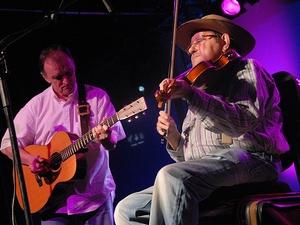Search
Rychard Carrington reports on Martin Carthy & Dave Swarbrick - The Junction, Cambridge, 1 October 2012

This was the folk revival at its truest: perhaps the best English trad duo of the sixties, playing in 2012 very much as they did forty-five years ago. The winning factors are instrumental virtuosity performed with feeling for the material and with total mutiual empathy; a deep feeling for the folk tradition; the strength of the tradition itself.
Folk has become less unhip in recent years, but folk often does not mean traditional, and even many acts regarded as traditional often feature quite a low proportion of traditional numbers oin their sets. Carthy and Swarbrick, though, introduce each number informatively, with unpompous respect for collectors, performers collected from and subject matter. The dues paid to O'Carolan, Sharp, Grainger and Lloyd will be paid to Carthy and Swarbrick in due course. Swarb was crucial to Fairport Convention's pionerring of English folk-rock, while Martin has participated in numerous inventive and eclectic projects, but it's this duo format that brings out the magnificence of trad folk most powerfully.
Carthy, now seventy-one (and did you know that he was born in Hatfield?) mostly stands, sporting a Hawaiian shirt that might seem incongruous but - to indulge in dubious semiotics - maybe signifies the ultimately affirmative nature of folk music, for all the grimness of situations portrayed. His vocals are as strong as ever. Also seventy-one, Swarb sits, podgy in jeans and braces, looking like the fiddler who has sat for decades by the hearth in a Hardyesque inn. Once the voice of Fairport,this evening he doesn't sing at all, but his fiddle is as magical as ever, taking our spirits far from twenty-first-century Cambridge into rural senes where folk and nature seem less separate. Yet the humanism of folk leads to no false Arcadia but to an an ingenuous sharing of authentic feeling: Carthy rightly updates My Son John, a song about the Napoleonic Wars collected from a military family in Bedford, to reference Iraq and Afghanistan.
Both have distinctive indstrumental styles, and hearing them playing together is as much a privilege as hearing the best jazz musicians improvising in full flight. Swarb favours unusual time signatures: "We have been playing together for about fifty years, and Martin knows how to say 'slow down' in about fifteen languages" he quips.
The set climaxed with Byker Hill, a song from their album of that name released in 1967, which I've known since 1979. The intense feeling that I get when hearing a live performance of a song that's been part of my life for so long came flooding in, even thouggh the lyrics - about miners in Newcastle having a good time - have no relevance to my life at all. Something shines through that song, and Martin and Swarb really do make it shine, ending with an instrumental workout to rival Coltrane or the Grateful Dead.
All hail Martin Carthy! All hail Dave Swarbrick! All hail the folk tradition! Thanks for a great gig, guys.
Writer: Rychard Carrington